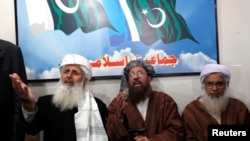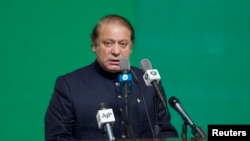ISLAMABAD —
Preliminary peace talks between the Pakistani government and and the Pakistani Taliban have been delayed after the government team failed to show up for a meeting in Islamabad Tuesday.
Both sides were scheduled to meet at the office of Jamaat-e-Islami, a major Islamic party. A group of Islamist leaders representing the Taliban appeared, but the government team decided at the last minute against attending the talks.
That move angered negotiator Sami ul-Haq, a radical Muslim cleric known as the Father of the Afghan Taliban.
He said the government team has retreated because Prime Minister Nawaz Sharif has "come under pressure” for his peace initiative. He did not elaborate and said Taliban doors are still open for talks, and both sides “need not waste this golden opportunity."
Government peace negotiator Rustum Shah Mohmand said in an interview with VOA that the Taliban had originally appointed a five-member negotiating team, but two of them backed out Monday.
“So, our committee was of the view that the best thing is let us wait for the Taliban committee to be completed and when it is fully constituted then we would make contact with them and meet them," Mohmand said. "But in the meantime the Taliban said that this [three-member team] is the final committee ... and I think in a day or two we are going to meet [with them] now.”
The Taliban team consists of leaders from Pakistani religious parties with representation in the national parliament, but there is no active leader or fighter of the insurgent group in the peace committee.
Mohmand says he is not optimistic about productivity of the talks with the existing Taliban team, even though the government has agreed to participate in the talks because it wants to bring an end to bloodshed in Pakistan as soon as possible.
“But real, meaningful productive [and] purposeful talks would be held with the members of the Tehrik-e-Taliban themselves because we believe that only they can take decisions on the vital issues like [exchange of] prisoners, like [presence of] foreign militants...like amnesty," he said. "These are very difficult and complex problems so they will have to sooner or later, in personal view, field their own team.”
Islamist militants are waging a bloody insurgency against the state of Pakistan under an umbrella organization called the Tehrik-e-Taliban Pakistan. The outlawed group wants its brand of Islamic law in the country, release of its fighters from jail and government troops withdrawn from northwestern tribal areas of Pakistan, known for harboring local and foreign militants.
Sharif has come under fire from liberal political forces and rights groups for engaging in peace talks with militants, who stage deadly attacks on Pakistanis and have claimed responsibility for murdering thousands of people in recent years.
But the prime minster insists peaceful means can help solve the problem of the militancy and use of military force has in fact strengthened the insurgency. Addressing a gathering of army officers Tuesday in Islamabad, he underscored the security threat facing Pakistan.
“The greatest challenge we face today is of law and order and internal security," Sharif said. " Broadly speaking, its manifestations include terrorism and extremism and sectarian conflict. I have no illusions that this is an extremely complex issue. It cannot be resolved by any one party or one institution. It requires a response of the entire nation."
Some critics describe the peace initiative as a violation of the country’s constitution, which does not allow the state to engage in talks with groups that condemn the national parliament as un-Islamic. But government negotiator Mohmand says any talks with the Taliban will be held within the law.
Both sides were scheduled to meet at the office of Jamaat-e-Islami, a major Islamic party. A group of Islamist leaders representing the Taliban appeared, but the government team decided at the last minute against attending the talks.
That move angered negotiator Sami ul-Haq, a radical Muslim cleric known as the Father of the Afghan Taliban.
He said the government team has retreated because Prime Minister Nawaz Sharif has "come under pressure” for his peace initiative. He did not elaborate and said Taliban doors are still open for talks, and both sides “need not waste this golden opportunity."
Government peace negotiator Rustum Shah Mohmand said in an interview with VOA that the Taliban had originally appointed a five-member negotiating team, but two of them backed out Monday.
“So, our committee was of the view that the best thing is let us wait for the Taliban committee to be completed and when it is fully constituted then we would make contact with them and meet them," Mohmand said. "But in the meantime the Taliban said that this [three-member team] is the final committee ... and I think in a day or two we are going to meet [with them] now.”
The Taliban team consists of leaders from Pakistani religious parties with representation in the national parliament, but there is no active leader or fighter of the insurgent group in the peace committee.
Mohmand says he is not optimistic about productivity of the talks with the existing Taliban team, even though the government has agreed to participate in the talks because it wants to bring an end to bloodshed in Pakistan as soon as possible.
“But real, meaningful productive [and] purposeful talks would be held with the members of the Tehrik-e-Taliban themselves because we believe that only they can take decisions on the vital issues like [exchange of] prisoners, like [presence of] foreign militants...like amnesty," he said. "These are very difficult and complex problems so they will have to sooner or later, in personal view, field their own team.”
Islamist militants are waging a bloody insurgency against the state of Pakistan under an umbrella organization called the Tehrik-e-Taliban Pakistan. The outlawed group wants its brand of Islamic law in the country, release of its fighters from jail and government troops withdrawn from northwestern tribal areas of Pakistan, known for harboring local and foreign militants.
Sharif has come under fire from liberal political forces and rights groups for engaging in peace talks with militants, who stage deadly attacks on Pakistanis and have claimed responsibility for murdering thousands of people in recent years.
But the prime minster insists peaceful means can help solve the problem of the militancy and use of military force has in fact strengthened the insurgency. Addressing a gathering of army officers Tuesday in Islamabad, he underscored the security threat facing Pakistan.
“The greatest challenge we face today is of law and order and internal security," Sharif said. " Broadly speaking, its manifestations include terrorism and extremism and sectarian conflict. I have no illusions that this is an extremely complex issue. It cannot be resolved by any one party or one institution. It requires a response of the entire nation."
Some critics describe the peace initiative as a violation of the country’s constitution, which does not allow the state to engage in talks with groups that condemn the national parliament as un-Islamic. But government negotiator Mohmand says any talks with the Taliban will be held within the law.











